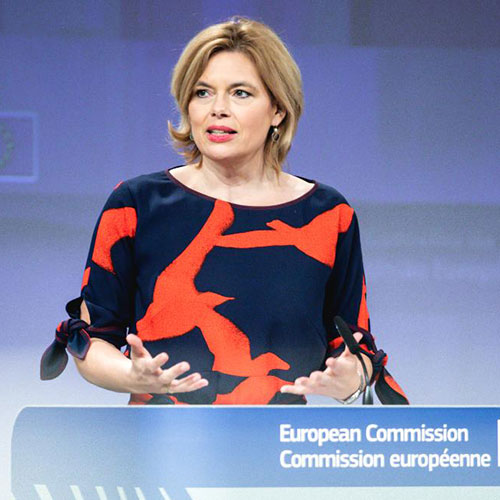Together for more added value and appreciation
Julia Klöckner on the new Common Agricultural Policy
On 1 July, Germany took over the presidency of the European Council for six months. During this period, we want to evolve the Common European Agricultural Policy. Since 21 July, we have one of the basic requirements for achieving this: political consensus regarding the multi-annual financial framework and therefore the CAP budget.
Although this consensus still requires the approval of the European Parliament, the result clearly shows that Europe has understood the value of our agriculture.
Around 387 billion euros will be available for the CAP for the 2021 to 2027 period. This amounts to a net increase of 1 percent or 4.3 billion euros. 43.8 billion euros are earmarked for Germany. With a slight decrease of 0.8 percent anticipated, the funds will therefore remain almost at their previous level.
We now intend to achieve planning security over the next few weeks. We therefore want to reach a quick agreement for the transitional period until the new CAP is implemented in practice. This will be linked to clear objectives. We want to create uniform, pan-EU parameters for more ambitious environmental, climate and animal protection. To do this, we need to link direct payments more extensively to environmental and climate measures. This will enable us to foster sustainability and the acceptance of agricultural production.
We need plannable direct payments that impact on income as well as less bureaucracy. The reduction of measures that distort competition must be driven forwards resolutely. My aim is to adopt a concrete position of the Member States as the 'Council's general approach', as it is known in technical terms, under the German presidency.
In addition to the CAP, the introduction of a European animal welfare label is also on my agenda. As a crucial factor on the road to sustainable and economically viable agriculture, digitalisation must continue to be developed. However, we will also be dealing intensively with food policy issues the coming six months, whether as regards extended nutrition labelling or measures for reducing food waste.
The European Commission has submitted several strategy papers that affect the core elements of agriculture: the Green Deal, the Farm To Fork Strategy and the Biodiversity Strategy. Amongst other aspects, requirements for agriculture are described there in the areas of fertilisation and crop protection, but their implementation must be affordable. Our farmers have to know precisely what they will be facing on the ground. We need a reliable impact assessment! We therefore have to clarify how the formulated objectives can be implemented and which costs are involved. If we expect more of our agriculture, we have to improve our support at the same time. I made this clear during my first appointments in July, which included a discussion with Commission Vice-President Timmermans.
The expectations on Germany are now high. One thing is clear to me, however. We need viable concepts for the coming years. I will commit myself to this during this presidency. The reason being that agriculture must continue to fulfil its primary task: the production of food at appropriate prices for the 450 million consumers in Europe. Because only it can ensure that we are well supplied – including in times of crisis.

